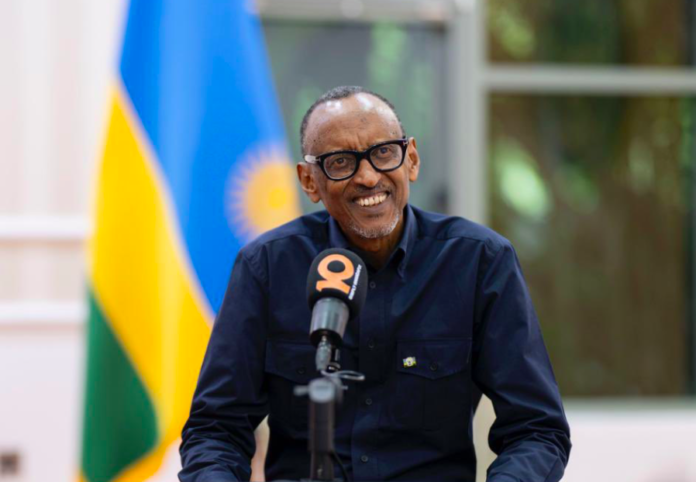On April 1, 2024, during an interview with Radio10 and Royal FM, Rwandan President Paul Kagame shared his insights on the enduring issues plaguing the Democratic Republic of Congo (DRC). President Kagame pinpointed the source of the DRC’s turmoil as internal, emphasizing the responsibility of the Congolese leaders and citizens rather than externalizing it to neighboring countries like Rwanda.
Journalist Aissa Cyiza prompted President Kagame to reflect on the persistent unrest in the DRC’s eastern regions, despite numerous dialogues aimed at resolving the conflict. Kagame reiterated that the core of the issue lies within the DRC itself. He criticized the tendency of international leaders to burden Rwanda with the DRC’s challenges, asserting that it is unjust and that the responsibility squarely falls on the Congolese leadership and its people.
Kagame metaphorically described taking on the DRC’s problems as akin to bearing the corpse of a hyena, highlighting the undesirability and the prolonged imposition of this burden on Rwanda. He underlined Rwanda’s own internal issues that necessitate focus, deeming it impractical to shoulder the problems of other nations, including the DRC.
The Rwandan leader further commented on the political dynamics affecting the DRC, situated to the west of Rwanda. He noted the European fears that inadequate engagement with the Congo could lead to increased Chinese and Russian influence. Kagame clarified that while international stakeholders have their interests in the DRC, the direct implication and burden should not fall on Rwanda.
Amid these geopolitical considerations, Kagame raised concerns over the exploitation of the DRC by those seeking profit, questioning the rationale behind Rwanda being implicated in the DRC’s internal matters. He touched upon the mistreatment of Congolese speaking Kinyarwanda, emphasizing that both Tutsi and Hutu communities are adversely affected, with Tutsis facing significant persecution.
President Kagame argued that the right to safety and security for these communities should not be contingent on requests; it should be inherently granted to prevent ongoing conflicts, deaths, and displacements. He firmly stated that finding a lasting solution to the DRC’s strife is a responsibility that lies with the Congolese government and not international bodies like the United Nations or Rwanda.
He also addressed the ongoing conflict in the eastern DRC, implicating FDLR, a Rwandan opposition group , now receiving support within the DRC. Kagame asserted that while Rwanda is willing to assist in resolution efforts, the primary responsibility to address these issues lies with the DRC to prevent further instability in the region.
Despite President Kagame’s stance, numerous United Nations reports, human rights organizations, and Western and American entities have suggested Rwanda’s significant role in exacerbating security issues in the DRC. Many Congolese Tutsi expressed skepticism about Kagame’s advocacy for Congolese Tutsis, suggesting a paradox in his actions that fuel ethnic tensions and conflicts in the DRC, including the utilization of Congolese Tutsis in broader geopolitical strategies aimed at controlling the region and its vast natural resources. They highlighted the tragic incident at the Kiziba refugee camp, where refugees seeking to return to the DRC were met with violence, illustrating the complexities and contradictions in Kagame’s policies towards the DRC.





























































